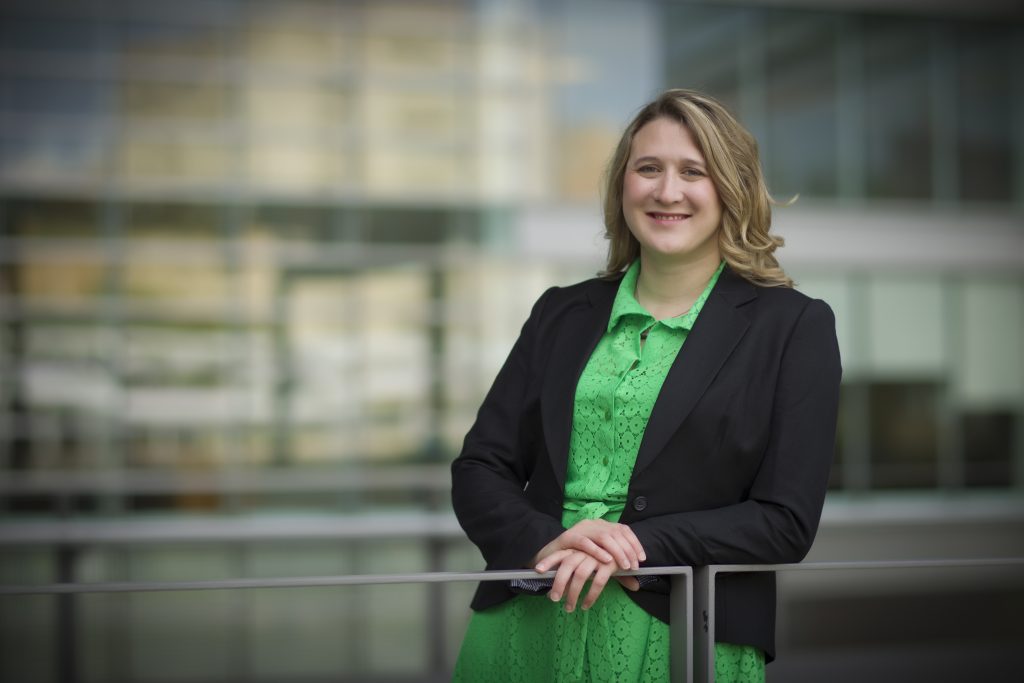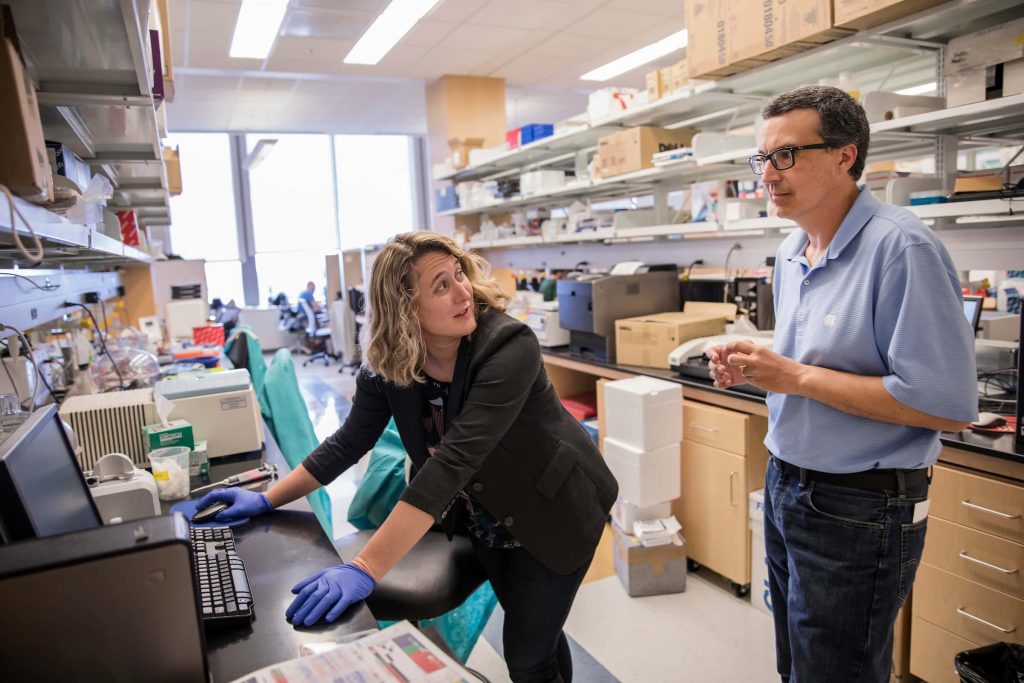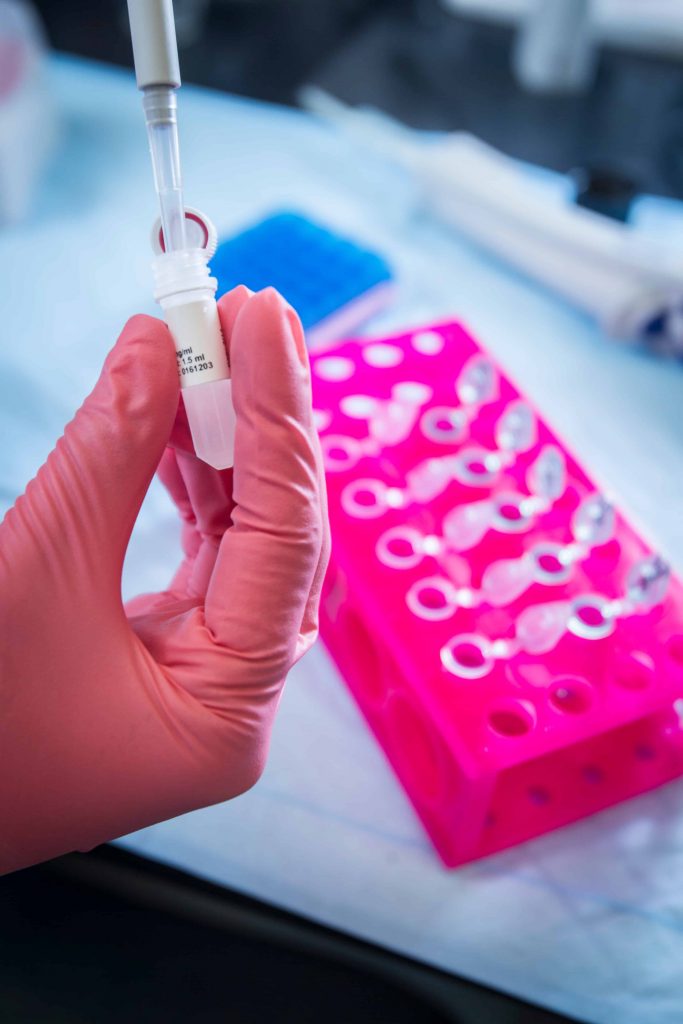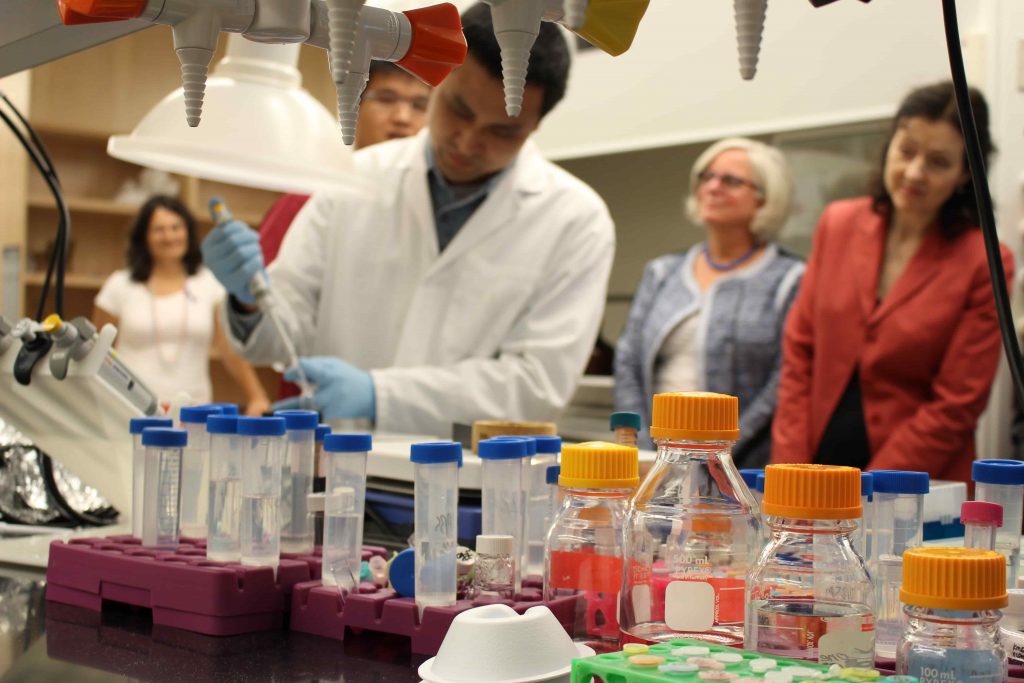
For UNC Lineberger’s Katherine Hoadley, PhD, the best way to make progress and major scientific breakthroughs is by working as a team.
A self-proclaimed “team science person,” Hoadley doesn’t just work on research with three or four other scientists, she publishes papers with 400-1,000 others dedicated to unraveling the mysteries of cancer. She absorbs feedback from those working alongside her, allowing her to look at problems from different angles. And the passions and interests of donors also come into play, raising new questions that Hoadley wants to answer.
“Feedback is great. Different backgrounds are beneficial, and they can change the direction you’re taking,” she said. “Everyone’s slightly different area of expertise helps our perspective. I’m always interested in hearing their views, it might help jog a different question or clue or way to analyze the data we have.”
Path to breast cancer research

Hoadley started her research career with the U.S. Department of Agriculture, studying plant physiology to improve the cold hardiness of peach trees to protect them from freezing temperatures. It was only after choosing UNC-Chapel Hill for graduate school that she found the right team for her, starting with her mentor, UNC Lineberger’s Chuck Perou, PhD.
“It set me on this path to study breast cancer, which is the biggest component of my lab,” she said. “At the time, I had no personal connection, no family history of cancer. I really liked the science and mentorship I got from Chuck, so it led me into the cancer field.”
Research and collaboration
Hoadley’s research focuses on genetic and genomic analyses of breast cancer data, and she had an active role in The Cancer Genome Atlas project, which analyzed more than 10,000 samples from 33 tumor types. She is collaborating with a fellow UNC Lineberger researcher, Melissa Troester, PhD, on understanding disparities in breast cancer, using patient data from clinical trials and the Carolina Breast Cancer Study, that looks at high breast cancer mortality rates in Black women and seeing if there are tumor-specific characteristics that are linked to race or mutations that may be caused by defects in DNA repair, UV exposure or smoking habits.
Hoadley Lab’s role in breast cancer research

The Hoadley Lab analyzes patient data from clinical trials to better classify aggressive basal-like breast cancers. These cancers look differently on a molecular level compared to other breast cancers, according to Hoadley, and her research looked at tumor specific features and the role of immune cells that surround these tumors. Funded by donor support, her team was able to sequence the tumors, classify genes and other indicators expressed in the tumors, and analyzed additional patient data to see if they could predict a response to chemotherapy and improve survival outcomes.
“Only half of patients are responsive [to chemotherapy.] There’s no good way of telling who will respond and who will not,” she said. “There’s a desperate need to identify people who will be responsive and identify better treatments for those who will not respond”
Hoadley hopes the approach will help improve outcomes for these subsets of patients that are responsive to treatment. She and her team will look at race, response to therapy and survival rates, and figure out better ways to treat the cancer.
“I’m so appreciative of funding to let me expand upon the work that I’m doing,” she said. “It’s incredibly helpful, and I’ll have a paper out in the next year or so on this work. I’m so incredibly grateful that people are supporting the research we’re doing at UNC Lineberger.”
Philanthropy supports and drives research
Philanthropic support is key to bringing these teams together, and even inspiring some research projects altogether. For Hoadley, interactions make all the difference in her work. She has given tours of her lab, and values the time spent interacting with potential supporters who ask thoughtful questions and get to know her work first-hand.

“We get to engage a lot of survivors and advocates in the community and help show people what their funds are doing and how we’re using them locally to advance cancer science,” she said.
Hoadley said the ability to share her research with more people is important, particularly in the breast cancer community, since there are a lot of patients and advocates who are very knowledgeable.
“It’s wonderful to see them not be afraid to ask questions and feel more connected to our research,” she said. “It gets us out of our scientific bubble.”
Importance of supporting pilot projects
Sometimes the philanthropic support or interest in a certain project may be smaller but can lead to bigger things down the line for Hoadley and her team.
“Even if it’s small or doesn’t have as big of an initial impact, philanthropy helps support you as you go for larger funding,” she said. “Supporting pilot projects is so important. We’re always developing new projects, and there’s no baseline data. You have to get that first, before getting bigger grants.”
Boosting overlooked areas of research
Hoadley said research is also a field where special interests are welcome, particularly if donors are passionate about a certain disease type. When donors designate money in specific areas, it can help boost overlooked areas of research or even inspire researchers to delve into questions they haven’t yet addressed.
“We often hear that there’s available funding support and would like to have someone look at it. We ask ourselves ‘what projects can we do and fit our research niche to help support their desire to see results in this tumor type?’” she said. “It’s difficult to find funding for rare cancer types, and someone who wants to support that direction is something that can really help. It gives us the opportunity to explore new cancer.”
